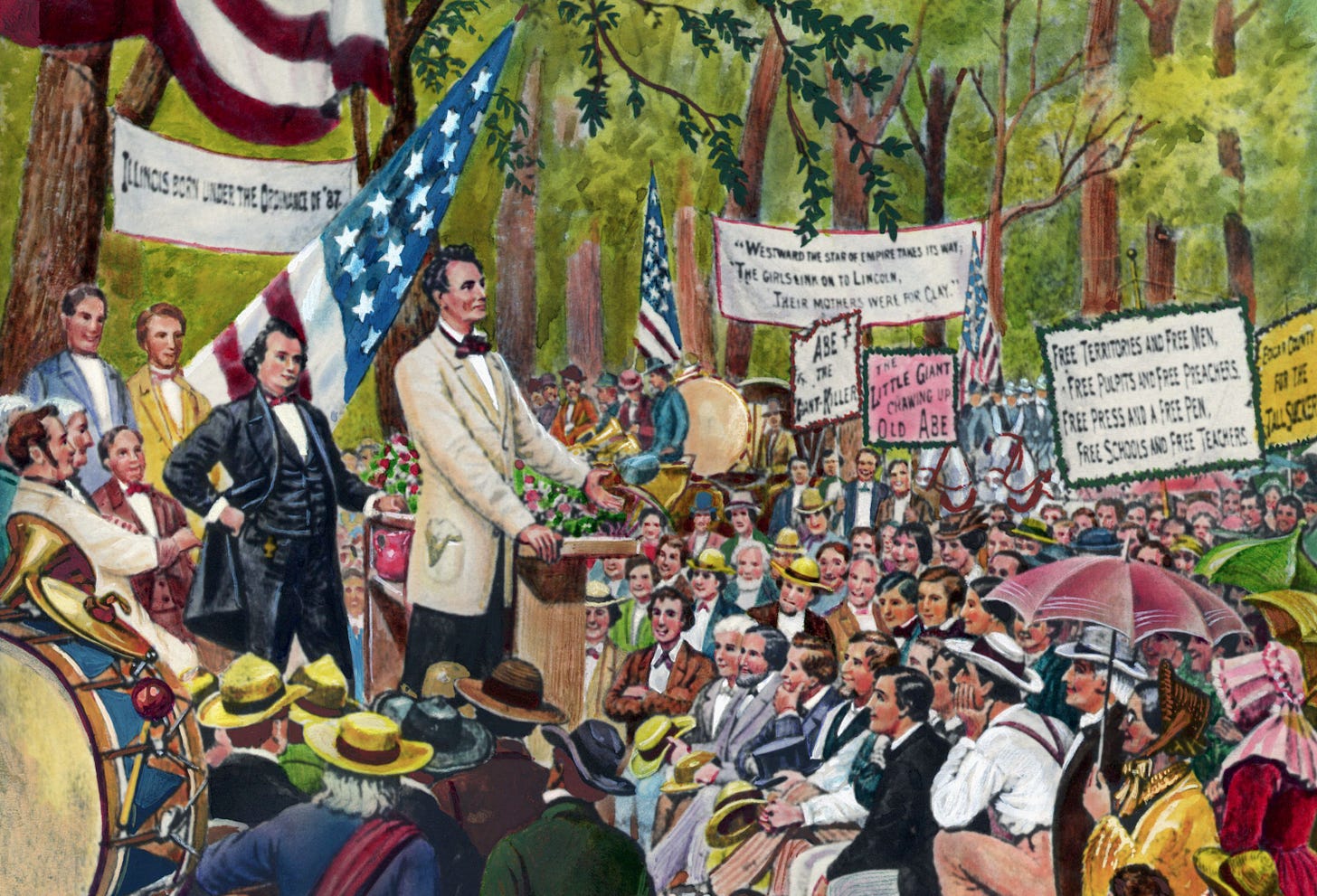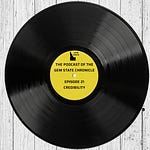Hello, welcome to the Gem State Podcast. My name is Brian Almon.
Goodness, I have been busy. Last week was the Republican State Convention, and I have covered that extensively with six separate posts plus a video, so I don’t need to spend any more time on it here. I also have the Great Reset series to finish up, so stay tuned for that. I intend to write about ESG and Modern Monetary Theory and then do at least one more post to wrap it all together.
Today I would like to start a new series called Civics 101. I find that schools have done a pretty poor job of teaching citizens how our government works, or at least how it is supposed to work. Turn on the TV and you can see people who expect the president to overturn a Supreme Court decision or some who think Senate seats can be gerrymandered. I understand that most people just want to live their lives, and spending time learning about such dry subjects as the role and function of government sounds like torture.
For that reason, I thought I would start this series of short, ten-minute discussions on various issues related to the constitutional structure of our government. Today I would like to talk about the US Congress, specifically the differences between the House and the Senate.
The idea of a Senate comes from ancient Greece and Rome. The upper classes of each city would elect from among themselves representatives who had governing authority. In Rome, only the patrician class could vote or hold senatorial rank – these were the descendants of the original founders of the city in the days of legend. Eventually the lower classes got representation as well.
The idea of a bicameral parliament can also be traced to medieval England. The House of Lords was filled with representatives of the noble classes – dukes, earls, barons, leaders of the church, etc. The House of Commons represented the lower classes, including landed gentry and merchants. The idea was that the Lords would naturally be more conservative, so as to act as a brake on the progressive nature of the Commons.
Today our House and Senate are very similar to each other. Representatives are apportioned to states by population and elected for two year terms, and there is a cap on the total number of representatives at 435. Senators are apportioned two to each state, regardless of population, which means there are currently 100 members of the Senate. Both representatives and senators are elected by the people – representatives are elected by voters in their district, and senators are voted on by the entire state. Here in Idaho we have two representatives - we have the 1st District and the 2nd District, and we also have two Senators.
It did not used to be this way. In the early days of the American republic, Senators were appointed by state legislatures. Why is that important? Because they were never meant to be simply uber-powerful representatives, rather they were supposed to be the voices of the sovereign states in the federal Congress. You can see this in the way the Constitution assigns different roles to the House and the Senate. The House, which was always meant to represent the people, is where spending bills originate. Did you know that? The Senate does not write bills appropriating money, they only vote on whatever the House sends them. Also, there is no filibuster in the House. The majority party can pretty much do whatever they want. This means that the House is naturally going to be more progressive, most of the time. They are going to want to move forward making changes in our society.
On the other hand, the Senate is tasked with confirming presidential appointments and ratifying treaties with foreign nations. Why the difference? Because originally this gave state governments a voice in how our nation operated. State legislatures, by appointing senators who represented their will, had a say in who the president appointed to run the executive branch as well as in how we handled international diplomacy. Of course, the Senate also has a filibuster, allowing the minority party to exercise some control, some restraint on legislation.
The interplay between these two very different houses of Congress was how our legislative branch was supposed to operate.
When Abraham Lincoln famously debated Senator Stephen Douglas across Illinois in 1858, they were not asking people to vote for them directly. They were instead stumping for their political parties. If the Republicans won a majority in the Illinois state house in Springfield, then they would appoint Lincoln to the Senate. If the Democrats retained their majority, then they would send Douglas back for another term. That is, of course, what happened, though Lincoln had the last laugh, winning the presidential election two years later.
It was Idaho Senator William Borah, among others, who pushed for the 17th Amendment more than a century ago. Some states had already switched to direct election of Senators, but the 17th Amendment made this the law of the land throughout the entire country. The feeling at the time was that state party bosses wielded too much power over the US Senate. This was the era of populism, where men like William Jennings Bryan traveled the country giving fiery stump speeches about the power of the people against the entrenched interests in government. Sound familiar?
Populist reformers like Senator Borah believed that allowing the voters to directly elect Senators would bring Congress more in line with the will of the people. I am not sure that has been the case. Once someone wins election to the US Senate, he or she becomes extremely hard to dislodge. Our current Senate delegation from Idaho is made up of Jim Risch, who was first elected 14 years ago, and Mike Crapo, who was initially elected 24 years ago, and is running for a fifth term as we speak.
On the other hand, the voice of the states has become all but silent in national affairs. There is now nobody in the federal government to advocate on behalf of states themselves as sovereign entities. This is one of many reasons why state sovereignty has been severely eroded over the last century. The 10th Amendment to the Constitution, which was the last of the Bill of Rights, says, “The powers not delegated to the United States by the Constitution, nor prohibited by it to the States, are reserved to the States respectively, or to the people.” That means that whatever powers are not explicitly granted to the federal government in the Constitution are the exclusive domain of the states. Yet today we have a federal government that has grown enormous and out of control, while states are made subservient to it.
One of the ways the federal government has done this is through appropriations. They started handing out our own taxpayer money as grants to various state agencies, and then said well, if you don’t follow our regulations, then you don’t get to have this money anymore. State governments became dependent on the federal government to operate, and the threat of taking away that money causes them to fall in line. Would this have happened if the Senate was still representative of the state legislatures? I’m not sure, but it is a problem.
Our founding fathers created a beautiful system of checks and balances in this country. Unlike in the British Parliament, where the Prime Minister is a member of the legislature, our president occupies his own branch, and is charged with executing the laws, not creating them. Our legislature is charged with creating laws, while the judiciary is independent. Our legislative branch had its own checks and balances, and the House and Senate originally had significantly different characters. The House represented the people of America in general, while the Senate represented the sovereign states. The nature of the Senate was to be more conservative, slowing down the progress of the House and allowing our country to have the necessary debates before bringing about significant changes to our society.
Today, many of those distinctions are erased, all in the name of giving more power to the people. But the genius of a republican form of government is that it is not a pure democracy, it is not mob rule. Our founding fathers knew that mobs are unruly things, quickly fired up, and easily manipulated by nefarious political actors. They built a system that allowed the people to direct the course of our government while protecting it from democracy’s worst impulses. Unfortunately, that system has been systematically dismantled, both by nefarious political actors, but also by those who are good-hearted but naïve about human nature.
The Idaho Republican Party platform calls for the repeal of the 17th Amendment and I fully support this idea. I doubt it will happen anytime soon, because anyone who suggests such a thing is denounced as wanting to take away peoples’ rights. But it would be a good step toward the restoration of our republic.
















Share this post